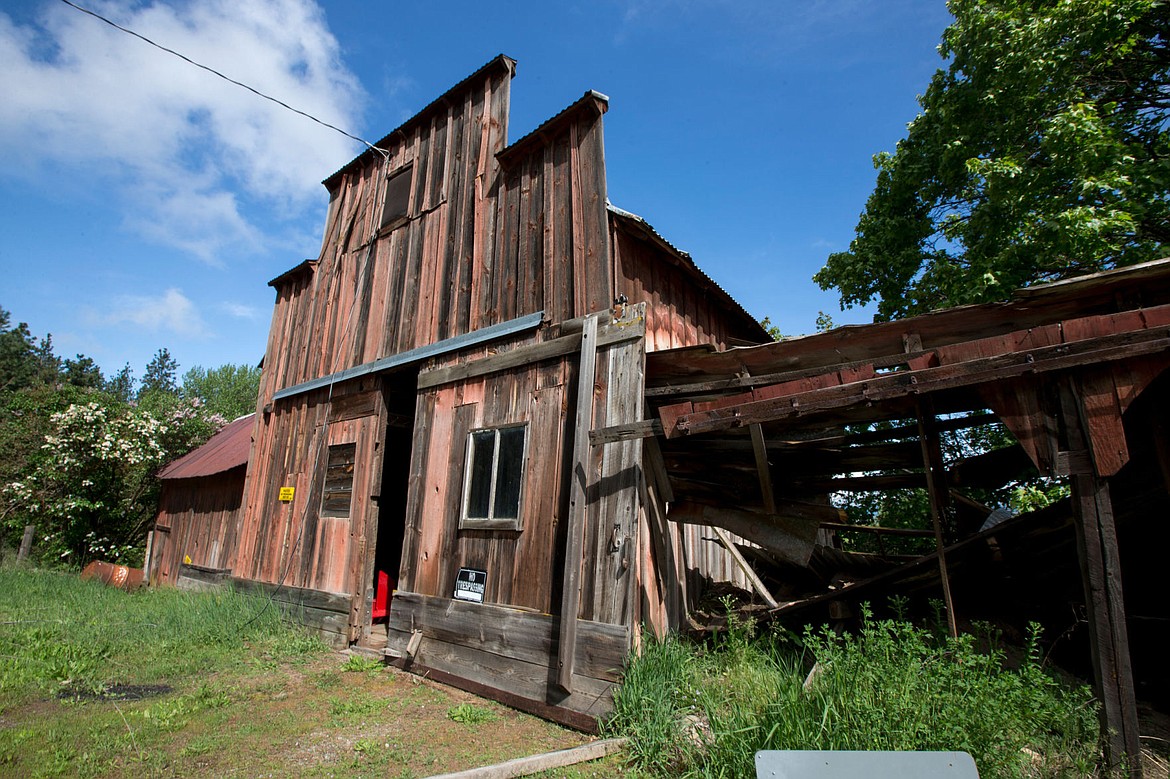Historic Pleasant View village being demolished
POST FALLS — Piece by piece, the historic Pleasant View village is coming down, being cleaned up and will be sold to homeowners as conversation pieces for years to come.
Dave Baker, of The Prairie Barn, LLC, purchased the turn-of-the-century buildings on the south side of the Spokane River south of Post Falls, including a mercantile, blacksmith shop, livery, homestead and others. He is taking them down and will sell the materials or build products with them.
"We have had people stop by who were concerned about us tearing them down, but when we talk to them about how they are not being destroyed but preserved in another form, they understand," Baker said. "Once something is beyond repair, there's two choices. The buildings can be bulldozed or the materials can be preserved and people can have the history in their own home."
The village, known by some locals as the Plonske property — named after the family that homesteaded and started some of the businesses there — has been the site of movie sets in recent years due to its Old West flavor. George and Bonnie Nipp, relatives of the Plonske family, recently sold the land to Mitch and Cammie Lawrence, who plan to build a home on the property.
Baker said he found newspapers from 1895 that were used as insulation in the old buildings.
"We'll preserve those behind glass," said Baker, who declined to say what he paid for the buildings. "We don't leave anything behind."
Other remnants from yesteryear he has come across include a forge that was used in the blacksmith shop, buried Model A car rims, lead-glass cabinetry and a cast-iron cookstove.
A booklet on the Pleasant View community published in 1986 by Peg Anderton brings readers back to the village's heyday.
Around 1908 Will Plonske built a store and later the blacksmith shop and mercantile. A gas pump was also installed with the advent of the automobile.
"Plonske makes weekly trips to Spokane for supplies," the booklet states. "It is a two-day journey by hoof power. Because Mr. Plonske sells feed at 5 to 10 percent discount to Farmers' Union members, many believe it is a Farmers' Union store. Not so, says the Plonske family. Mr. Plonske, a trusting generous-hearted individual someone everybody likes, willingly extends credit (sometimes too much) to his customers."
The former Pleasant View bridge built in 1908 was next to the village and parts of that structure are sill in the ground.
"This bridge is a vital year-round link with highway and rail service on the north side, especially the electric commuter train between Spokane and Coeur d'Alene," the booklet states.
Other historic sites in the Pleasant View community off West Riverview Drive still exist, including a school that's being restored, church and cemetery.
Plonske named the community.
"As he gazes across the Spokane River from his homestead at the charming scenery, the level meadow, the pleasing vista of rolling peak-like foothills, loftier mountains dazzling in winter whiteness and the pleasing contrast of pine green, rock gray and blue sky, he often says, 'This is a Pleasant View,'" the booklet states.
During the Great Depression of the 1930s, Plonske, like many business owners, closed his store due to hard times.
"The fickle finger of fate twists his dream of prosperity into interesting-looking buildings that tempt too many uninvited curiosity seekers to trespass upon private property for a closer look," the booklet states
Baker said years of burglaries at the abandoned village continue today. In just the two weeks he has been working at the site, he said, an estimated $3,000 worth of items have been stolen. Such items included a 1901 wall-mounted drill press, a rare six-panel door, auto parts and even track rollers off doors.
"They literally took a saw and cut (the rollers) off," said Baker, adding he filed a report with the Kootenai County Sheriff's Office. "It's people who know what they are doing and what they're worth. In talking with the previous owners, a lot has gone out of there over the years. It's sad that people do that. They seem to think that it's old stuff, nobody cares and we're going to take our fair share."
Baker said he has had to shoo people off the property.
"They say that they just want to look around and that it's a public road, but it's really a private road," he said, adding the county deeded it back to the property owners.
Local historian Syd Albright produced a film called "TAPS" at the Plonske property in 2008 that featured Civil War actors.
Fred Plonske's property became Harrison's Landing on the James River in Virginia circa July 1862 when Union army Gen. George McClellan withdrew his troops after fighting the Peninsula Campaign.
Albright said he was saddened to hear the buildings were coming down.
"I was hoping that it could be preserved and used as a tourist attraction," he said.
But Baker, who said he'll be done tearing down the last of the seven buildings by July 1, said it would be cost-prohibitive to bring the buildings up to code.
Neighbor Michael Powers, who has lived near the village for 14 years, said he'll miss it.
"It's been a part of the neighborhood experience for us," he said. "We've taken walks by there, and kids grew up playing over there. Up until a couple years ago, there was neat signage outside. It was quite well-preserved until recent years."
Baker said the history of the Pleasant View village will live on in other places. He even plans to make plaques with some of the wood stating where it came from along with furniture and home decor.
"When they buy these items, there will be a story to go with them," he said.







